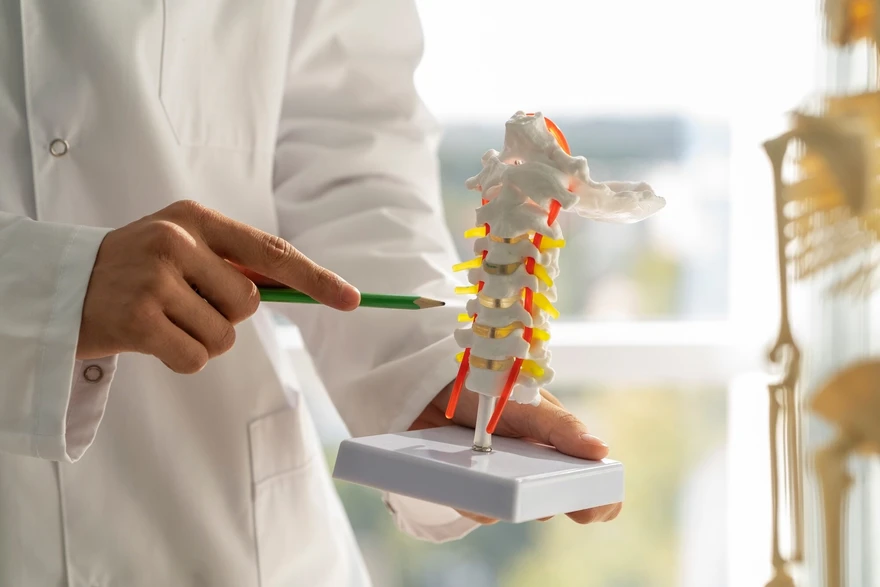Preventive Healthcare
Understanding Spinal Cord Injury: Types, Symptoms, Causes, and Treatment

Table of Contents
- What is a spinal cord injury?
- What are the types of spinal cord injuries?
- How common are spinal cord injuries?
- What are the symptoms of a spinal cord injury?
- What can cause a spinal cord injury?
- What are the complications of spinal cord injuries?
- How are spinal cord injuries diagnosed?
- How are spinal cord injuries treated?
- How can I prevent spinal cord injuries?
- What is the outlook for spinal cord injuries?
- Conclusion
What is a spinal cord injury?
A spinal cord injury occurs when trauma or damage affects the spinal cord and disrupts its crucial role in the transmission of nerve signals between the brain and the body. This interruption can lead to varying degrees of sensory, motor, and autonomic function impairment, depending on the severity and location of the injury along the spinal cord.
Spinal cord injuries can result from accidents, falls, sports injuries, or medical conditions. The impact of a spinal cord injury can be life-altering, affecting mobility, sensation, and bodily functions below the injury site.
What are the types of spinal cord injuries?
Spinal cord injury types are further classified into two main categories: Complete and Incomplete.
- A complete spinal cord injury results in total loss of sensory and motor function below the injury level due to no nerve connections below the injured site.
- In contrast, an incomplete spinal cord injury allows varying degrees of preserved sensory or motor function below the affected area. It allows the spinal cord to send some messages to and from the brain, allowing some feeling and control of the muscles below the injury site.
A spinal cord injury type and severity determine the extent of impairment and recovery potential. Rehabilitation and medical interventions play critical roles in managing spinal cord injuries and improving long-term outcomes for affected individuals.
How common are spinal cord injuries?
Every year globally, between 250,000 and 500,000 people suffer a spinal cord injury, as reported by the World Health Organisation. In India, the incidence is estimated to be around 20 per million population. Road traffic crashes, falls, and violence are among the top causes of these injuries.
What are the symptoms of a spinal cord injury?
The signs and spinal cord injury symptoms can differ widely depending on its severity and location.
Common symptoms include:
- Loss of Movement or Altered Sensation (ability to feel Heat, Cold and Touch)
- Loss of Bowel or Bladder Control
- Exaggerated Reflex Activities or Spasms
- Changes in Sexual Function and Fertility
- Pain due to damage to Nerve Fibres in your Spinal Cord
Emergency signs post an accident may includes extreme back pain, numbness or loss of control in any part of the body, trouble with balance and walking, and difficulty breathing.
What can cause a spinal cord injury?
A spinal cord injury can be caused by various traumatic and non-traumatic events that lead to damage or disruption of the spinal cord's delicate nerve tissues.
- Traumatic spinal cord injury causes include car accidents, falls from heights, sports injuries, and acts of violence, where sudden impact or force fractures or dislocates vertebrae, compressing or tearing the spinal cord.
- The non-traumatic spinal cord injury cause include medical conditions such as tumours, infections like meningitis or polio, or degenerative diseases like arthritis or spinal stenosis, which can gradually impair or compromise the integrity of the spinal cord over time.
Understanding the multiple spinal cord injury causes is important for prevention, early intervention, and planning effective treatment strategy aimed at minimizing the severity of injury and optimizing recovery outcomes for affected individuals.
What are the complications of spinal cord injuries?
Spinal cord injuries can lead to a range of complications that significantly impact quality of life and overall health.
- Primary complications include loss of motor function, sensory impairments such as numbness or tingling, and changes in bowel and bladder control. Chronic pain and muscle spasms are also common, affecting daily activities and comfort levels.
- Secondary complications include immobility and altered body functions, such as pressure ulcers due to prolonged sitting or lying, respiratory problems such as pneumonia or atelectasis, and urinary tract infections.
- Furthermore, individuals with spinal cord injuries may face challenges with sexual function and fertility.
Management of these complications requires a multidisciplinary approach that includes medical care, rehabilitation, adaptive techniques, and lifestyle changes to promote independence and reduce the health risks associated with spinal cord injury.
How are spinal cord injuries diagnosed?
Spinal cord injuries are diagnosed through a medical history, physical examination, and diagnostic tests. Doctors will evaluate symptoms such as loss of sensation or movement, pain, and changes in bowel or bladder function. Imaging tests such as X-rays, CT scans, or MRI scans can help detect spinal cord injuries, fractures, or herniated discs.
Neurological assessment determines the extent and location of the injury by measuring reflexes, muscle strength, and sensory responses. Electromyography (EMG) and nerve conduction studies may also be used to assess nerve function. Prompt diagnosis is critical to developing an appropriate treatment and rehabilitation plan based on each patient's specific injury severity and needs.
How are spinal cord injuries treated?
Spinal cord injury treatment focuses on stabilizing spine, preventing further damage, and maximizing recovery.
- Initially, immobilisation with a brace or traction may be necessary.
- Surgery may be required to remove debris, stabilise fractures, or relieve pressure on the spinal cord.
- Medications like corticosteroids may be administered to reduce inflammation and swelling.
- Rehabilitation involves physical therapy to improve strength, flexibility, and mobility, as well as occupational therapy to regain daily living skills.
- Assistive devices such as wheelchairs or orthotics aid in mobility and independence.
- Ongoing medical management addresses the complications like pain, spasticity, and bladder or bowel dysfunction.
- Collaborative care involving specialists in neurology, orthopaedics and rehabilitation is essential for the comprehensive, long-term spinal care injury treatment.
How can I prevent spinal cord injuries?
To prevent spinal cord injuries, prioritize safety measures such as wearing seat belts in cars, wearing a helmet during sports, and avoiding risky activities such as diving in shallow water. Strengthening muscles and bones through regular exercise also reduces the risk of spinal cord injuries by improving overall physical resilience and stability.
What is the outlook for spinal cord injuries?
The outlook for spinal cord injuries varies depending upon their severity and location. Advances in medical treatment, rehabilitation, and assistive technologies offers hope for an improved functional recovery and quality of life. Ongoing research into spinal cord regeneration and neuroplasticity promises future breakthroughs in treatment options and outcomes for people with spinal cord injuries.
Conclusion
While a spinal cord injury can seem overwhelming initially, remember that you are not alone through this journey. Reach out to healthcare professionals who can guide you through diagnosis and spinal cord injury treatment. Remember Metropolis Healthcare is here to assist you as well with their advanced diagnostic services. You can book an at-home sample collection for any necessary tests.





















